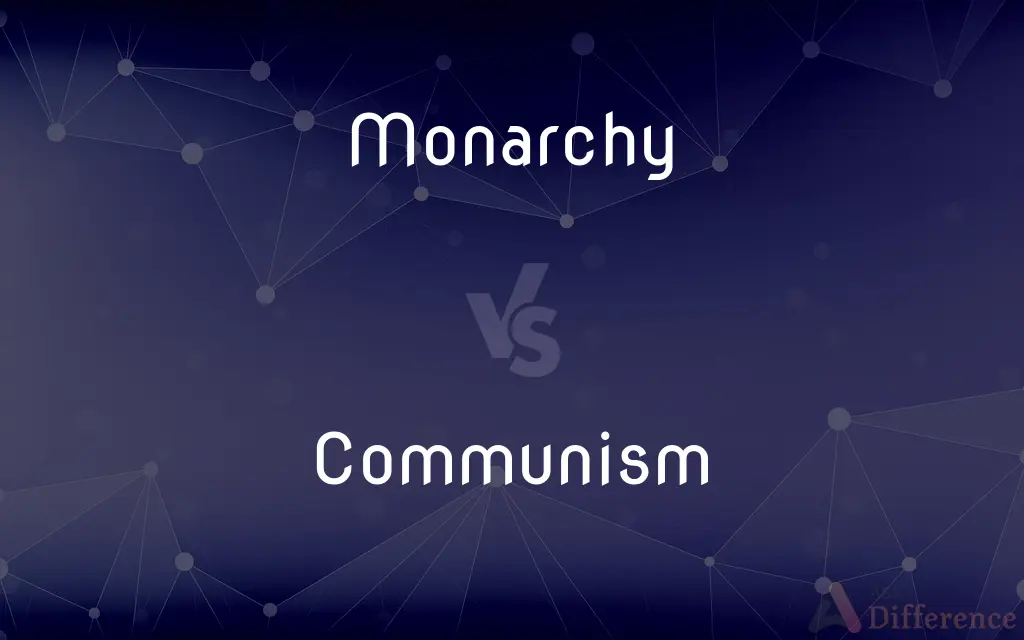Monarchy vs. Communism — What's the Difference?
Edited by Tayyaba Rehman — By Fiza Rafique — Updated on April 30, 2024
Monarchy involves a single or group of rulers based on hereditary succession, whereas communism abolishes all class distinctions, advocating for a classless, stateless society.

Difference Between Monarchy and Communism
Table of Contents
ADVERTISEMENT
Key Differences
Monarchy is a political system centered around a monarch who usually inherits their position by birth. In contrast, communism is an ideology that seeks to establish a classless society where the means of production are owned communally.
In a monarchy, the power is often centralized in the hands of a king, queen, or emperor, which can lead to a highly stratified social structure. On the other hand, communism aims to eliminate social hierarchy by distributing power and resources equally among all members of society.
Monarchical systems can vary widely, ranging from absolute monarchies where the monarch has significant control over the government, to constitutional monarchies where the monarch’s powers are limited by a constitution. Whereas, communism rejects any form of hierarchical government and aims for a totally egalitarian administration.
Monarchies support the notion of a leadership that is guided by historical precedent and lineage. Communism, however, strongly focuses on revolutionary socio-political change to remove class distinctions.
While monarchies may promote individual leadership and continuity, providing a symbolic and unifying figurehead for the state, communism promotes collective leadership, shunning the idea of a single leader or ruling class.
ADVERTISEMENT
Monarchies often have a cultural heritage that includes a history of royal families and lineage. Communism, in contrast, encourages the dismantling of heritage that involves class distinctions or elitism, focusing instead on communal progress.
Comparison Chart
Definition
Government with hereditary rulers
Ideology advocating classless society
Power Structure
Centralized in an individual or family
Power shared among all people
Social Structure
Hierarchical, with distinct classes
Aims for a classless, egalitarian society
Political Ideals
Leadership continuity, tradition
Revolutionary change, egalitarianism
Governance
Can be absolute or constitutional
Seeks to abolish state structures
Compare with Definitions
Monarchy
A state ruled by a king, queen, emperor, or empress.
Japan is considered a constitutional monarchy.
Communism
A social, political, and economic ideology aiming for a classless system.
In communism, everyone is supposed to contribute according to their ability and receive according to their needs.
Monarchy
A form of government in which sovereignty is embodied in one or several individuals continuing until death or abdication.
Queen Elizabeth II was one of the world's most recognized monarchs.
Communism
A political theory derived from Karl Marx, advocating class war and leading to a society in which all property is publicly owned.
Marxism-Leninism of the Soviet Union aimed to establish a communist state.
Monarchy
A government rooted in inheritance and lineage.
Monarchical succession often involves complex rules about who is next in line.
Communism
A system where the state plans and controls the economy and a single, often authoritarian party holds power.
Chinese communism features a significant amount of government control over everyday life.
Monarchy
An institution that maintains a symbolic and unifying figurehead.
Swedish monarchy acts as a unifying symbol for the nation.
Communism
A belief in the elimination of private property.
Communists argue that private property creates social inequality.
Monarchy
A system where the state is headed by a monarch.
In the United Kingdom, the monarchy is largely ceremonial with real power lying in parliament.
Communism
A theory or system of social organization based on holding all property in common.
Cuban communism involves state control over most economic activities.
Monarchy
A monarchy is a form of government in which a person, the monarch, is head of state for life or until abdication. The political legitimacy and authority of the monarch may vary from restricted and largely symbolic (constitutional monarchy), to fully autocratic (absolute monarchy), and can expand across the domains of the executive, legislative, and judicial.
Communism
The international socialist society where classes, money, and the state no longer exist.
Monarchy
Government by a monarch.
Communism
Communism (from Latin communis, 'common, universal') is a philosophical, social, political, and economic ideology and movement whose ultimate goal is the establishment of a communist society, namely a socioeconomic order structured upon the ideas of common ownership of the means of production and the absence of social classes, money, and, in some cases, the state. As such, communism is a specific form of socialism.
Monarchy
A state ruled or headed by a monarch.
Communism
A theoretical economic system characterized by the collective ownership of property and by the organization of labor for the common advantage of all members.
Monarchy
A government in which sovereignty is embodied within a single, today usually hereditary head of state (whether as a figurehead or as a powerful ruler).
An absolute monarchy is a monarchy where the monarch is legally the ultimate authority in all temporal matters.
A constitutional monarchy is a monarchy in which the monarch's power is legally constrained, ranging from where minor concessions have been made to appease certain factions to where the monarch is a figurehead with all real power in the hands of a legislative body.
Communism
A system of government in which the state plans and controls the economy and a single, often authoritarian party holds power, claiming to make progress toward a higher social order in which all goods are equally shared by the people.
Monarchy
The territory ruled over by a monarch; a kingdom.
Communism
The Marxist-Leninist doctrine advocating revolution to overthrow the capitalist system and establish a dictatorship of the proletariat that will eventually evolve into a perfectly egalitarian and communal society.
Monarchy
A form of government where sovereignty is embodied by a single ruler in a state and his high aristocracy representing their separate divided lands within the state and their low aristocracy representing their separate divided fiefs.
Communism
Any far-left political ideology or philosophy advocating holding the production of resources collectively, especially by seizing it through revolution.
Monarchy
States based on a system of governance headed by a king or a queen.
Communism
Any political social system that implements a communist political philosophy.
Monarchy
A state or government in which the supreme power is lodged in the hands of a monarch.
Communism
A scheme of equalizing the social conditions of life; specifically, a scheme which contemplates the abolition of inequalities in the possession of property, as by distributing all wealth equally to all, or by holding all wealth in common for the equal use and advantage of all.
Monarchy
A system of government in which the chief ruler is a monarch.
In those days he had affected zeal for monarchy.
Communism
A form of socialism that abolishes private ownership
Monarchy
The territory ruled over by a monarch; a kingdom.
What scourage for perjuryCan this dark monarchy afford false Clarence.
Communism
A political theory favoring collectivism in a classless society
Monarchy
An autocracy governed by a monarch who usually inherits the authority
Common Curiosities
Can a monarchy be democratic?
Yes, in a constitutional monarchy, the monarch's powers are limited by law, allowing for a democratic form of government.
What is the main difference between monarchy and communism?
Monarchy is based on individual or familial rule often inherited, while communism is a classless, state-driven ideology.
What economic system does communism advocate?
Communism advocates for a centrally planned economy with communal ownership of production means.
What happens to personal wealth in a communist system?
In a strict communist system, personal wealth beyond basic necessities is often redistributed or controlled by the state to ensure equal distribution among all citizens.
What roles do monarchs play in modern societies?
In modern constitutional monarchies, monarchs often serve ceremonial roles and are symbols of national continuity and unity.
Can communism coexist with other political systems?
In theory, communism is distinct and often incompatible with other political systems due to its foundational principles of classlessness and state control; however, some countries blend communist principles with other forms of governance.
How does communism address leadership?
In theory, communism involves collective leadership and decision-making, with no single leader or ruling class.
How does inheritance work in a monarchy?
Inheritance in a monarchy typically follows rules of succession, often based on primogeniture (firstborn succession) or other hereditary lines, determining who becomes the next monarch.
What are the key criticisms of communism?
Communism often faces criticism for its potential to lead to authoritarian governance, inefficiencies in economic management, and suppression of individual freedoms due to its centralized control.
Are there any successful communist countries today?
While few countries still claim to be communist, countries like China and Vietnam have incorporated elements of market economics with communist governance, experiencing significant economic growth.
How does a monarchy support national identity?
Monarchies often bolster national identity by embodying historical traditions, cultural heritage, and continuity, serving as a living symbol of the nation's history and unity.
How do communists view religion?
Communists typically view religion as a tool of the bourgeoisie to maintain control over the proletariat, advocating for secularism or atheism in state affairs.
What is the role of the monarchy in the legislative process in a constitutional monarchy?
In a constitutional monarchy, the monarch may have formal roles in the legislative process, such as signing bills into law or opening parliamentary sessions, but these are largely ceremonial.
How is education viewed in communist ideologies?
Education in communist ideologies is typically viewed as a tool for enlightening the populace, promoting values of equality, community service, and collective responsibility.
What does it mean to live in a constitutional monarchy?
Living in a constitutional monarchy means having a monarch with limited or ceremonial powers, where most of the governmental authority resides in elected bodies.
Share Your Discovery

Previous Comparison
Gyrus vs. Sulcus
Next Comparison
Classification vs. PredictionAuthor Spotlight
Written by
Fiza RafiqueFiza Rafique is a skilled content writer at AskDifference.com, where she meticulously refines and enhances written pieces. Drawing from her vast editorial expertise, Fiza ensures clarity, accuracy, and precision in every article. Passionate about language, she continually seeks to elevate the quality of content for readers worldwide.
Edited by
Tayyaba RehmanTayyaba Rehman is a distinguished writer, currently serving as a primary contributor to askdifference.com. As a researcher in semantics and etymology, Tayyaba's passion for the complexity of languages and their distinctions has found a perfect home on the platform. Tayyaba delves into the intricacies of language, distinguishing between commonly confused words and phrases, thereby providing clarity for readers worldwide.
















































